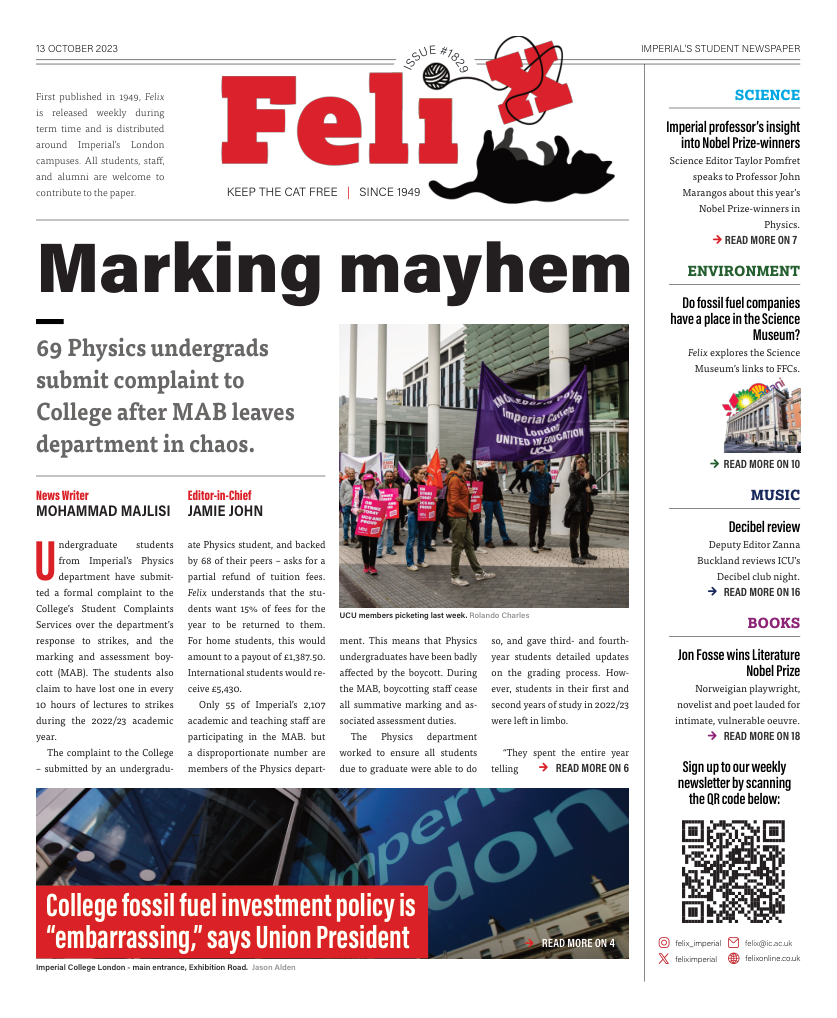Marking mayhem: MAB leaves Physics department in chaos
69 Physics undergrads submit complaint to College after MAB leaves department in chaos.

Undergraduate students from Imperial’s Physics department have submitted a formal complaint to the College’s Student Complaints Services over the department’s response to strikes, and the marking and assessment boycott (MAB). The students also claim to have lost one in every 10 hours of lectures to strikes during the 2022/23 academic year.
The complaint to the College – submitted by an undergraduate Physics student, and backed by 68 of their peers – asks for a partial refund of tuition fees. Felix understands that the students want 15% of fees for the year to be returned to them. For home students, this would amount to a payout of £1,387.50. International students would receive £5,430.
Only a small minority of Imperial’s 2,107 academic and teaching staff are participating in the MAB. but a disproportionate number are members of the Physics department. This means that Physics undergraduates have been badly affected by the boycott. During the MAB, boycotting staff cease all summative marking and associated assessment duties.
The Physics department worked to ensure all students due to graduate were able to do so, and gave third- and fourth-year students detailed updates on the grading process. However, students in their first and second years of study in 2022/23 were left in limbo.
“They spent the entire year telling us how they were improving student satisfaction and then did this with our results,” said one undergraduate physicist. “I have lost all faith in the department that they are actually trying to improve our experience.”
Carlo Contaldi, Deputy Head of Department (Education), said: “MAB was very traumatic for some of our students – those ones that weren't lucky enough to be third and fourth years where we had to do all the hard work to mitigate. And there are still outstanding marks that they're missing.”
“The thing I'd like to stress is how seriously we take in this, it's not a simple lip-service exercise.”
“Poor communication and baffling decisions”
One of the complainants’ principal grievances is poor communication from the department. An email sent to students in May specified which examinations had not been marked as a result of the MAB. But, allege the complainants, it later transpired that the details in the email were incorrect.
Furthermore, in mid-July, students were sent emails to inform them of their progression status. At this time, some modules had been marked in full, and some only partially, as a result of the MAB.
The department told students that, provided they had passed all the fully-marked modules, they would be given provisional passes – allowing them to progress to the next year.
If it was later found that they had failed a MAB-affected module, they would have to resit the relevant exam in the next academic year (2023/24).
To avoid the risk of an additional exam the following year, students were told they could resit the exam in August 2023 – before they knew whether they had failed. “On what basis does the department [think] the student should resit the exam?” asks the complaint.
“This is an unenviable choice,” it continues. “Either suddenly revise for an exam with only a month’s notice – potentially only to find out that you actually passed – or cram the exam in with a multitude of others in the following year.”
Some students have told Felix that they remain in a state of confusion. One said they were left “critically depressed and anxious”.
In order to aid students with the choice, the department reviewed the marks they did hold, and made a judgement on whether it was likely students would pass the affected modules. The complaint submitted to the College says it was unclear how this judgement was made.
Some second-year students on the MSci track were distressed to find that the department had advised them to transfer to the BSc programme. The Physics department requires that students achieve above a certain grade threshold in order to progress to an MSci. “Due to the marking and assessment boycott, we cannot confirm whether these criteria have been reached,” reads one email advising a student to transfer to a BSc.
“We are being pressured to take decisions with incomplete information, on short notice, and with poor communication,” summarise the complainants. They allege that the problems they have encountered are “part of a wider culture of poor communication and baffling decisions”.
Some students have told Felix that they remain in a state of confusion. One said they were left “critically depressed and anxious”.
“The teachers have every right to strike, but the department has been fucking inept at dealing with the fallout,” said another.
Contaldi, the Deputy Head of Department, said that improving communication was his “number one priority”, and that the department was recruiting more staff to address the problem.
“We have a huge, huge focus on this now,” he said. “We’re increasing the admin support we have in delivering the undergraduate degree, because we’ve been understaffed for many years. It’s going to be a real game-changer for Physics.”
The department has appointed Professor Richard Thompson to investigate the complaint, and the outcome of his investigation is expected in the coming weeks.









